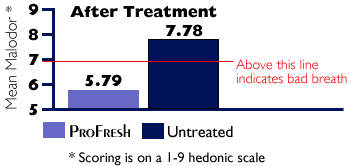Determining the Effectiveness of an Oral Homecare Regimen in Controlling Malodor by Hilltop Reasearch Inc., 900 Osceola Drive, West Palm Beach, Florida 33409
1.0 SUMMARY The study was conducted using a randomized, evaluator-blind, no treatment control test design with two treatment groups. A total of 60 subjects participated in this study. Thirty-six of these subjects were randomized to the ProFresh HomeCare Maintenance Program and twenty-four remained untreated controls. The objective of the study was to evaluate the effectiveness of the ProFresh regimen in controlling human intrinsic oral malodor using hedonic methodology. Candidates reported to the clinical facility, executed an informed consent and were screened by the examining dentist to rule out oral pathology. A panel of five trained and experienced odor judges were utilized for each of the testing sessions. Subjects were then assessed for oral malodor on two consecutive mornings prior to initialization treatment and once after using the regimen twice daily for seven days. A direct nose-to-mouth organoleptic technique was employed using glass tubes. A mean baseline organoleptic odor score of> 7 was used as the criteria for halitosis. Qualified subjects were given the treatment and asked to use it twice per day for seven days. On the morning of Day 8, 12-15 hours after last use of the regimen, subjects returned to the test facility for a post-treatment breath odor assessment. Again a mean odor score was calculated and compared to the baseline score. Results of this study showed that the ProFresh Homecare Regimen significantly reduced oral malodor whereas the untreated group did not show any effect. Three subjects on the ProFresh regimen did not return on Day 8 for the post-treatment evaluation. No adverse events were reported during the study. 2.0 RESULTS The results of the analysis of covariance indicated that the ProFresh regimen was significantly (p=0.0001) more effective in the control of oral malodor at 12 hours after the 14 treatments (7 days of twice a day use) than Untreated. The mean odor scores are summarized below: 
3.0 CONCLUSIONS Thirty-six subjects were randomized to receive the ProFresh Homecare Maintenance Program kit and 24 remained untreated. A mean organoleptic odor score of > 7 was used as the criteria for halitosis. After using the ProFresh Homecare regimen twice daily for seven days, twenty-nine out of 33 subjects (88%) showed a mean odor score of < 7 compared to only 3 of 24 subjects (13%) on the untreated group. The statistical analysis of the data showed that the ProFresh Homecare Maintenance Program significantly reduced oral malodor while the untreated control group did not show this effect. |